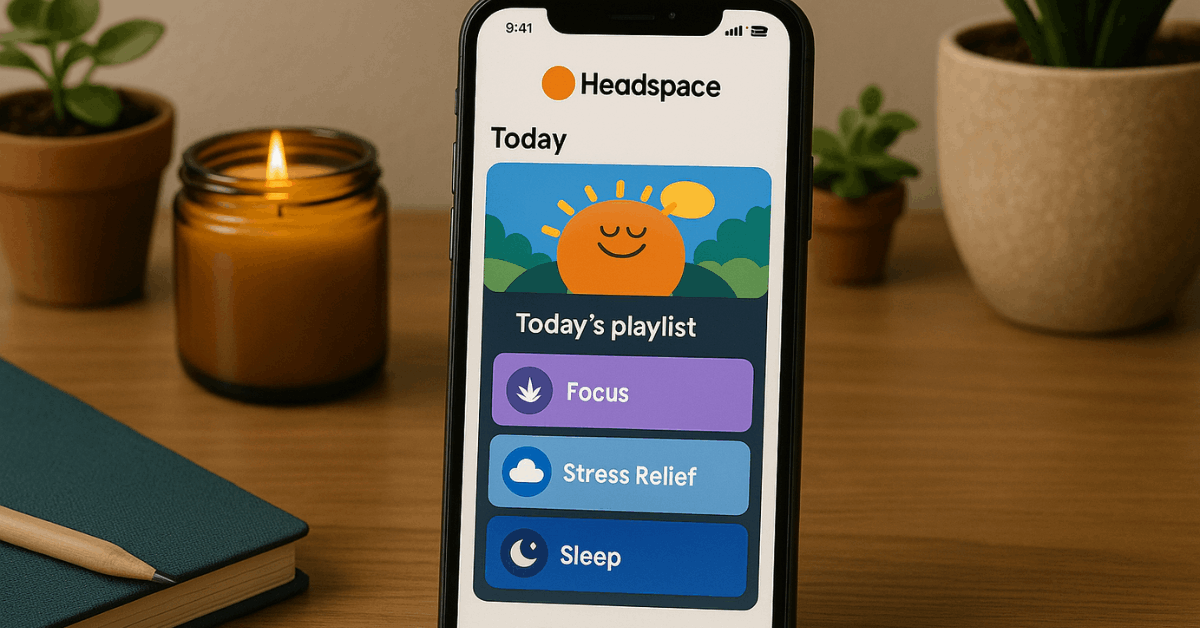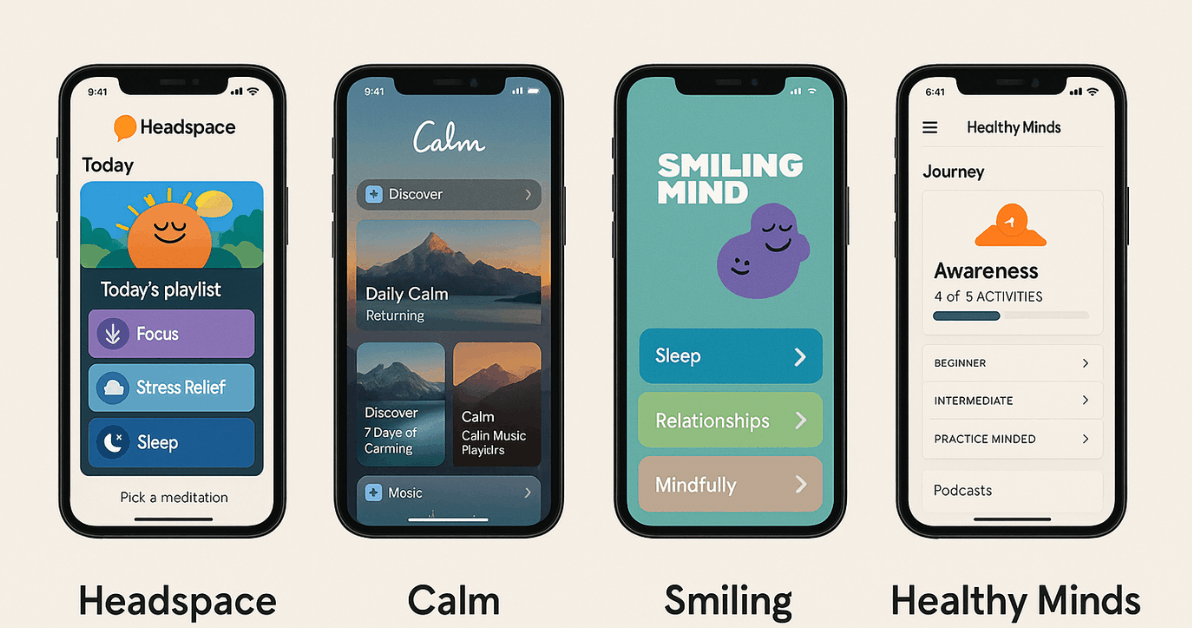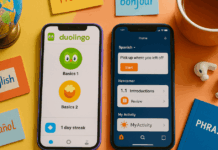You don’t need long hours or expensive programs to reduce stress and stay focused. Mindfulness apps offer guided lessons, customizable tools, and flexible access wherever you are.
If you want a reliable way to build a daily meditation habit, this guide will help you choose the right app based on practical features, pricing, and its support for your goals.
Why Mindfulness Apps Deserve Space on Your Home Screen
Regular meditation lowers cortisol, improves emotional regulation, and can even boost immunity.
Portable apps remove scheduling hurdles, deliver structured lessons on demand, and let you practise whenever tension spikes—on a train commute, in an office lobby, or during a late-night worry spiral.
How This Guide Rates Each App
A clear framework prevents guesswork when you weigh competing options.
- Content depth — large libraries covering stress, focus, and sleep.
- Beginner pathways — sequenced courses easing novices into daily habits.
- Flexible tools — adjustable timers, downloadable sessions, and mood logs.
- Clean navigation — intuitive menus and minimal visual clutter.
- Accessible pricing — free tiers or trials so you can test risk-free.
- Cross-platform reach — iOS, Android, and tablet compatibility for worldwide users.

Our Top Pick: Headspace
Headspace blends playful design with serious depth, guiding you through thousands of meditations that address anxiety, grief, productivity, and creative blocks. Courses build gradually, so you refine technique while tackling real-world challenges such as interview nerves or writer’s block. Daily “Today” playlists surface fresh content, and optional group sessions create community without geographical limits.
- Annual subscription averages US $69.99 after a two-week free trial.
- Sessions range from three-minute resets to hour-long deep dives.
- Extras include sleepcasts, focus music, and on-device progress tracking.
Headspace earns the overall recommendation because its structured tracks keep momentum high while its bite-size singles accommodate hectic schedules.
Best for Flexible Sessions and Ambient Soundscapes: Calm
Calm suits users who already dabble in mindfulness and now want more freedom. The app mixes guided and unguided modes, offers open-ended timers, and hosts an extensive music catalogue for work or bedtime. A mood log encourages reflection, and generous kids’ content helps young users develop emotional literacy.
- Calm Premium costs about US $69.99 per year after a free trial.
- Sleep Stories feature well-known narrators, smoothing the transition into deeper rest.
- Members can gift one-month passes or share permanent content links with friends.
If your practice thrives on variety and sound-based relaxation, Calm provides ample tools without feeling prescriptive.
Best Free Structured Path: Healthy Minds Program
Healthy Minds Program delivers a four-pillar curriculum—awareness, connection, insight, purpose—through concise audio lessons that expand in five-minute increments. A starting survey establishes a baseline score, then adaptive checkpoints reveal measurable growth.
- The entire catalogue remains free; donations are optional.
- Two narrator choices let you match voice tone to personal preference.
- Offline downloads support practice in low-signal environments.
Budget-conscious learners gain a logical progression normally locked behind paywalls, making Healthy Minds a standout entry point worldwide.
Best Free Option for Younger Users: Smiling Mind
Developed by psychologists, Smiling Mind targets children and teenagers but scales well for any beginner who appreciates a breezy interface. Simple animations, gentle voiceovers, and short exercises remove intimidation while teaching core mindfulness skills.
- The app is completely free and ad-free.
- Session lengths adjust in five-minute steps to suit short attention spans.
- Progress dashboards reward consistency and spark motivation.
Parents, teachers, and guidance counsellors can confidently recommend Smiling Mind to foster early mental health habits without subscription hurdles.

Other Noteworthy Apps at a Glance
A quick roundup spotlights additional platforms with specialised strengths. Use these summaries to match niche needs.
| App | Key Benefit | Platform | Price Snapshot |
| The Mindfulness App | Integrates reminders into daily routines and syncs with health trackers. | iOS, Android | Tiered plans; basic features free. |
| Buddhify | Situation-based meditations like walking, work breaks, or sleepless nights. | iOS, Android | Low-cost one-time fee plus optional expansion packs. |
| 10 % Happier | Straight-talking teachers ideal for sceptics seeking no-nonsense guidance. | iOS, Android | Free starter kit; full access via monthly or annual plan. |
| Sattva | Vedic mantra focus led by Sanskrit experts for tradition-oriented practitioners. | iOS | Core content free; premium challenges add depth. |
| Stop, Breathe & Think | Emotion check-in tailors sessions and includes journaling prompts. | iOS, Android | Freemium with affordable unlocks. |
These alternatives illustrate the sector’s diversity and underscore that one size never fits all.
Choosing the Right App for Your Situation
Clarify personal goals before hitting download. If improved sleep tops the list, prioritise platforms with robust bedtime libraries.
Users craving structured progression should favour multi-week courses that build duration gradually. Budget constraints call for generous free tiers or one-time fees rather than rolling subscriptions.
Building a Consistent Practice
Sporadic sessions offer momentary comfort, but steady routines deliver lasting resilience. Adopt the tactics below to elevate consistency.
- Schedule micro-sessions directly after habitual tasks:
Link your mindfulness practice to something you already do daily, like your morning coffee or brushing your teeth. By anchoring it to an existing habit, you create a reliable routine that feels natural and easy to maintain. - Use app reminders rather than generic phone alarms:
Mindfulness apps often include thoughtful, gentle reminders designed to prompt practice at the right moment. These are less disruptive than regular alarms and more likely to encourage you to pause and engage mindfully. - Track mood metrics weekly to visualise progress:
Most apps let you log your mood before or after sessions. Reviewing these logs weekly can reveal patterns in how meditation affects your well-being, which helps maintain high motivation and reinforces the habit. - Pair meditation with another calming habit:
Enhance your practice by combining it with a peaceful activity like stretching, sipping tea, or journaling. This creates a ritual that makes mindfulness more enjoyable and rooted in a soothing context. - Gradually extend duration by two minutes each week:
Begin with short sessions and gradually increase the duration. Adding just two minutes each week can help you avoid burnout and make it easier to establish a sustainable routine that fits your lifestyle.
Conclusion
Your smartphone can transform from stress trigger to serenity hub when a thoughtfully chosen mindfulness app sits on the home screen.
Compare libraries, pricing, and interface style, pick an option aligned with personal objectives, then commit to regular sessions. Consistency—not novelty—turns brief breaths into a lifelong buffer against anxiety and stress worldwide.





